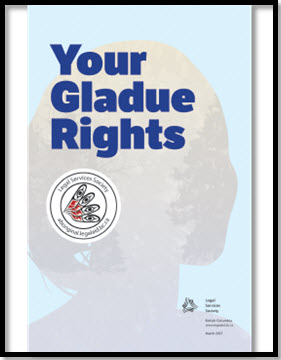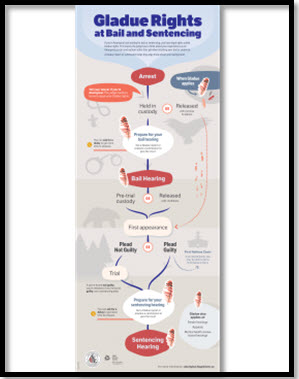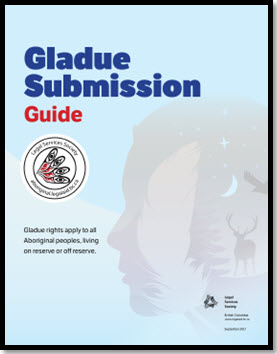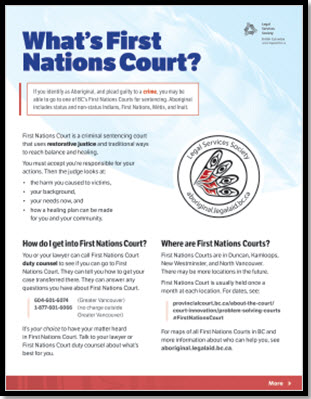Note: The Legal Services Society is now Legal Aid BC.
The Legal Services Society (LSS) has a variety of publications to help Aboriginal peoples in BC understand their legal rights. Several of their more recent publications focus on ‘Gladue rights’ and First Nations Court. In this eNews article, LSS describes its booklets and posters that provide information about Aboriginal legal rights. While intended for Aboriginal peoples, the resources are helpful to anyone interested in this area of Canadian law.

What are Gladue rights?
Because of their unique circumstances, in Canada all Aboriginal peoples have legal rights, often called Gladue rights, named from a Supreme Court of Canada decision. These rights come from section 718.2(e) of the Criminal Code and the way the Supreme Court of Canada has interpreted it. The Court said the criminal justice system had failed Aboriginal peoples. It said Parliament intended section 718.2(e) to address the fact Aboriginal people are over-represented in jails and to make sure they’re treated fairly when they’re being sentenced by a court. The LSS booklet Your Gladue Rights provides a plain language introduction to Aboriginal peoples’ Gladue rights, including the history of the Gladue case and what happens in court.

Gladue factors at sentencing
The decision in Gladue requires that judges consider the unique systemic factors that may have contributed to the Aboriginal person getting in trouble with the law. These Gladue factors are events that affect Aboriginal peoples in general, and those that have affected the Aboriginal person being sentenced, their family, and their community. Many of these factors, like a parent or grandparent having attended a residential school, are intergenerational.
Judges must consider all options other than jail when sentencing any offender. With regard to Aboriginal people, taking a restorative justice approach is meant to restore balance and harmony to the community and give the Aboriginal person and any victims of their crime the opportunity to heal and move forward. If the judge has no choice but to send the Aboriginal person to jail, the judge must still apply Gladue when they decide how long the jail sentence will be.
The LSS infographic poster Gladue Rights at Bail and Sentencing illustrates when Gladue is applied at bail and sentencing hearings, and when to get a Gladue report or prepare a Gladue submission.

Gladue reports and Gladue submissions
The Supreme Court of Canada said the best way to give the necessary information about the Aboriginal person to the court may be in a Gladue report or Gladue submission. Gladue reports and submissions help to educate judges about the unique circumstances that affected and continue to affect all Aboriginal peoples. They provide details about the Aboriginal person’s background and their personal history in an Aboriginal context, to help explain the circumstances that brought them before the court. The judge can then decide the best sentence for the Aboriginal person and their community.
For more information about preparing a submission, see the new LSS booklet Gladue Submission Guide. Also, LSS will soon be publishing a new resource for Gladue report writers, the Gladue Report Guide.

First Nations Court
Aboriginal people in BC who plead guilty to a crime and accept responsibility for their actions can apply to have sentencing hearings in First Nations Court.
This criminal sentencing court uses restorative justice and traditional ways to reach balance and healing. The Aboriginal person works with a team to develop a healing plan to help them, their community, and the victim to move forward. In developing the plan, the judge considers the harm caused to the victim and the person’s background and current needs.
The LSS fact sheet What’s First Nations Court? provides more information, including how to get into the court and who’s at the court. The Provincial Court of British Columbia website has information about sitting dates at each location: Duncan, Kamloops, Merritt, New Westminster, North Vancouver, and dates for Prince George should be posted soon.
More information about Aboriginal legal rights
You can find more information about Aboriginal legal rights plus more publications and videos for Aboriginal peoples on LSS’s Aboriginal Legal Aid in BC website.

